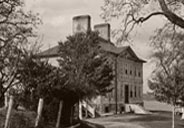
In 1747, the General Assembly passed the Tobacco Inspection Act, which designated the towns where tobacco could be exported from (and inspected before export). Since London Town was no longer one of those towns, planters did not bring their tobacco to town, and trade fell off. European wars impacted colonial trade as well. The emergence of Annapolis as a port, and the growth of Baltimore at the end of the century, all contributed to the decline of London Town. However, it was the disruption in trade during the American Revolution that ultimately led to the town's disintegration.
As London Town declined, people moved to Annapolis and elsewhere; buildings rotted away and land returned to farmland. Eventually, the large brick tavern that William Brown built was purchased by Anne Arundel County in 1823 to house the poor as the County Almshouse. After the Almshouse closed in 1965, the land became a park and museum.

Today, the park at London Town is only a quarter of the town's original size. Researchers and archaeologists continue investigating the town using primary source documents and artifacts. The buildings are being rebuilt in the locations where they originally stood, using the tools and technology of the eighteenth century. When you visit London Town, try to imagine the many people who called this once-bustling tobacco port home – imagine the different sights, sounds, and smells of the town. Imagine the sight of the many-masted eighteenth-century sailing ships in the river, and horses and people in the streets. Imagine the sounds of fiddle music and drums (whether African or Indian or English in origin). Imagine the smells too: from the sweet smells of fresh tobacco and spices from the orient, and fresh baked bread, to the acrid smells of hearth fires or animal dung from horses and pigs (no doubt pigs ran through the streets, as they did in most colonial towns).


